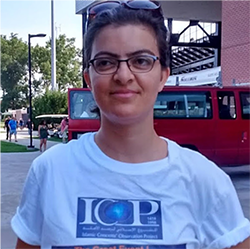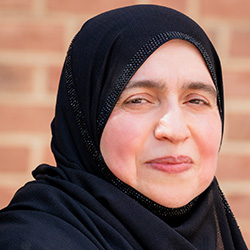Kefaya Diab and Nabila Hijazi: Faculty Reading
Writers At Work
Tuesday, September 21st 6pm
 Kefaya Diab is a Postdoctoral Fellow in the Writing Department at Loyola University Maryland.
She holds a Ph.D. in Rhetoric and Professional Communication from New Mexico State
University. She identifies as an activist-teacher-scholar. Her service, research,
and teaching agenda exemplify her understanding of the rhetoric and composition field’s
responsibility toward fighting the fight for social justice in and outside of academia.
Thus, activism to her implies taking personal risks for the well-being of the collective
community. In her research, Dr. Diab currently works on her monograph “Theorizing
a Sense of Agency in the Arab Spring (2010-11), where she theorizes how a sense of capability emerged
among Arab revolutionaries from rhetorical ecologies informed by religion and culture
in the region. At this time, she is preparing for a documentary film about the Tunisian
revolution (2010-11) to film and edit in collaboration with Tunisians who contributed
to their revolution. The documentary will offer a counter-narrative to what mainstream
Arab and Western media widely circulated during their coverage of the revolution.
Dr. Diab’s work has appeared in the WAC Clearing House Open Source Book: Sexual Harassment
and Cultural Change in Writing Studies, Composition Studies Journal, and Paideia-16
Textbook. Her article “The Rise of the Arab Spring through a Sense of Agency” is forthcoming
in the Rhetoric Society Quarterly (RSQ) Journal. As a teacher, Dr. Diab embodies a critical pedagogy informed by Paulo
Freire (1996) where she challenges her students to analyze problems in the world around
them and respond to transform reality into a socially just one. She implements community-based
learning and anti-racist labor-based writing approaches adapted by Asao Inoue (2019).
With her students, she constructs and executes a learning curriculum that critiques
biased language standards and promotes writing as a process and assessment as a collective
effort in the classroom.
Kefaya Diab is a Postdoctoral Fellow in the Writing Department at Loyola University Maryland.
She holds a Ph.D. in Rhetoric and Professional Communication from New Mexico State
University. She identifies as an activist-teacher-scholar. Her service, research,
and teaching agenda exemplify her understanding of the rhetoric and composition field’s
responsibility toward fighting the fight for social justice in and outside of academia.
Thus, activism to her implies taking personal risks for the well-being of the collective
community. In her research, Dr. Diab currently works on her monograph “Theorizing
a Sense of Agency in the Arab Spring (2010-11), where she theorizes how a sense of capability emerged
among Arab revolutionaries from rhetorical ecologies informed by religion and culture
in the region. At this time, she is preparing for a documentary film about the Tunisian
revolution (2010-11) to film and edit in collaboration with Tunisians who contributed
to their revolution. The documentary will offer a counter-narrative to what mainstream
Arab and Western media widely circulated during their coverage of the revolution.
Dr. Diab’s work has appeared in the WAC Clearing House Open Source Book: Sexual Harassment
and Cultural Change in Writing Studies, Composition Studies Journal, and Paideia-16
Textbook. Her article “The Rise of the Arab Spring through a Sense of Agency” is forthcoming
in the Rhetoric Society Quarterly (RSQ) Journal. As a teacher, Dr. Diab embodies a critical pedagogy informed by Paulo
Freire (1996) where she challenges her students to analyze problems in the world around
them and respond to transform reality into a socially just one. She implements community-based
learning and anti-racist labor-based writing approaches adapted by Asao Inoue (2019).
With her students, she constructs and executes a learning curriculum that critiques
biased language standards and promotes writing as a process and assessment as a collective
effort in the classroom.  Nabila Hijazi is a Postdoctoral Fellow in the Writing Department at Loyola University
Maryland. She received her doctorate in English Language and Literature with a concentration
in Rhetoric and Composition in 2020 from the University of Maryland College Park.
In her dissertation, “Syrian Refugee Women in the Diaspora: Sustaining Families through
Literacies,” which received Honorable Mention in the 2020 President’s Dissertation
Award by The Coalition of Feminist Scholars in the History of Rhetoric and Composition,
she draws on interviews and community-based work with Syrian refugee women in the
Washington, D.C. region to examine the cultural, economic, and political dimensions
of their Arabic literacy practices and English literacy learning in the United States.
Twice, she won first place in “Graduate Research Interaction Day,” under the category,
“Exploring Identities and Their Expressions.” Some of her publications (forthcoming)
include “Bodies in Conflict: Embodied Challenges and Complex Experiences” in the edited
collection, Our Body of Work, where she takes up the notion of embodiment to analyze Syrian refugee women’s experiences
that make the physical body a source of knowledge; and a chapter in the collection
Feminist Circulations: Rhetorical Explorations Across Space and Time, where she traces Muslim women’s rhetorical tradition by tracking rhetorics that
circulate and recirculate in the Middle East to rethink how rhetoric and religion
circulate to a different context, temporality, and geographical location and relate
to Muslim, gendered identity. Nabila has over a decade of teaching experience, teaching
traditional, hybrid, and online classes. She taught classes in academic writing, technical
writing, writing center theory and practice, grammar, women’s studies, and comparative
literature. Recently, she won the James Robinson Teaching Award, acknowledging her
effective pedagogical practices over many years of teaching at Maryland. She worked
for the University of Maryland Graduate School Writing Center and helped create resources
to train Fellows to effectively work with international graduate students. Also, she
has administrative experience, while serving as an Assistant Director for the University
of Maryland Writing Center and later for the Academic Writing Program, mentoring new
instructors. Nabila continues her research in translingual writing and Muslim, immigrant,
and refugee women’s rhetorics and literacy practices.
Nabila Hijazi is a Postdoctoral Fellow in the Writing Department at Loyola University
Maryland. She received her doctorate in English Language and Literature with a concentration
in Rhetoric and Composition in 2020 from the University of Maryland College Park.
In her dissertation, “Syrian Refugee Women in the Diaspora: Sustaining Families through
Literacies,” which received Honorable Mention in the 2020 President’s Dissertation
Award by The Coalition of Feminist Scholars in the History of Rhetoric and Composition,
she draws on interviews and community-based work with Syrian refugee women in the
Washington, D.C. region to examine the cultural, economic, and political dimensions
of their Arabic literacy practices and English literacy learning in the United States.
Twice, she won first place in “Graduate Research Interaction Day,” under the category,
“Exploring Identities and Their Expressions.” Some of her publications (forthcoming)
include “Bodies in Conflict: Embodied Challenges and Complex Experiences” in the edited
collection, Our Body of Work, where she takes up the notion of embodiment to analyze Syrian refugee women’s experiences
that make the physical body a source of knowledge; and a chapter in the collection
Feminist Circulations: Rhetorical Explorations Across Space and Time, where she traces Muslim women’s rhetorical tradition by tracking rhetorics that
circulate and recirculate in the Middle East to rethink how rhetoric and religion
circulate to a different context, temporality, and geographical location and relate
to Muslim, gendered identity. Nabila has over a decade of teaching experience, teaching
traditional, hybrid, and online classes. She taught classes in academic writing, technical
writing, writing center theory and practice, grammar, women’s studies, and comparative
literature. Recently, she won the James Robinson Teaching Award, acknowledging her
effective pedagogical practices over many years of teaching at Maryland. She worked
for the University of Maryland Graduate School Writing Center and helped create resources
to train Fellows to effectively work with international graduate students. Also, she
has administrative experience, while serving as an Assistant Director for the University
of Maryland Writing Center and later for the Academic Writing Program, mentoring new
instructors. Nabila continues her research in translingual writing and Muslim, immigrant,
and refugee women’s rhetorics and literacy practices.
Upcoming Events
Writers at Work: Faculty ReadingProfessors Frederick Bauerschmidt and Andrea Thomas
September 29 at 6pm
Fourth Floor Program Room
Writers at Work: R.Eric Thomas
Thursday, October 23rd at 6:00pm
Fourth Floor Program Room
Becoming Bulletproof
Monday, October 27th at 7:00pm
Fourth Floor Program Room
Modern Masters:Zoë Schlanger
Wednesday, November 19th at 6:30pm
McManus Theater
Writing Alumni Panel
Thursday, Febuary 12th at 6:30pm
Hug Lounge
Modern Masters: Vauhini Vara
Monday, March 9th at 6:30pm
Fourth Floor Program Room
One Question
Wednesday, March 22nd at 7:00pm
Fourth Floor Program Room
Writers at Work: Brenda Peynado
Thursday, April 9th at 6:00pm
Fourth Floor Program Room